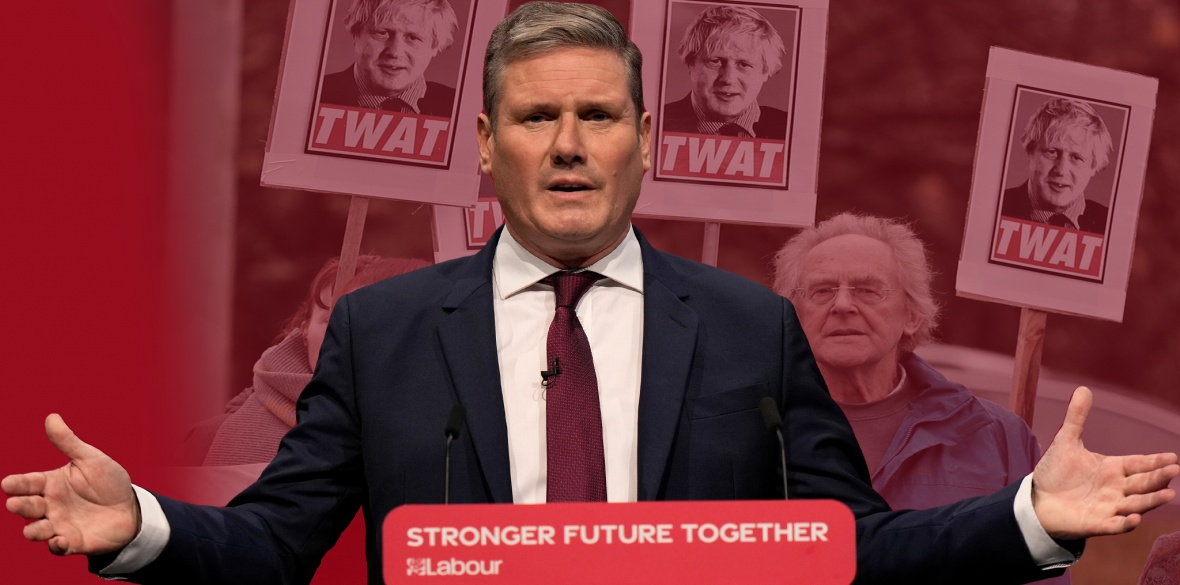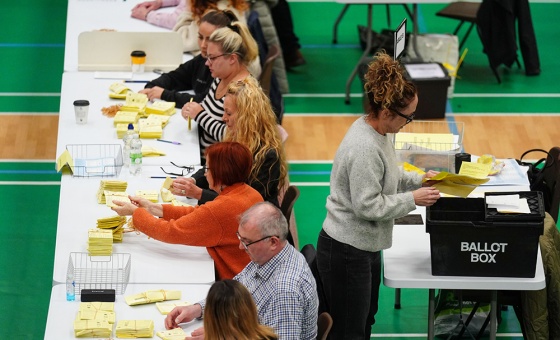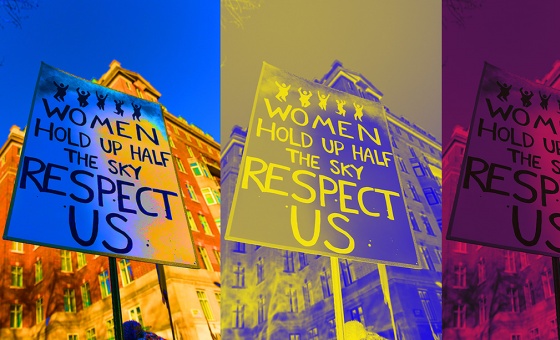This is the last article you can read this month
You can read more article this month
You can read more articles this month
Sorry your limit is up for this month
Reset on:
Please help support the Morning Star by subscribing here
IN THE voters’ popularity stakes Boris Johnson’s standing has vacillated wildly over the past year. The only point at which more voters had a positive rather than negative view of the Prime Minister was at the height of the NHS success in rolling out the vaccination programme.
The Ukraine crisis has given him some respite — Labour’s slim lead has lessened and Tory support is up by two points, as is the Greens’, but the Owen Paterson affair made a big dent and the unending series of revelations about Number 10 parties deepened distrust to the point where — as the Ukraine crisis began to worsen — only 35 per cent approved of him.
On the eve of the Russian invasion two thirds of voters disapproved of his performance and his positive rating was down to 21 per cent.
For the moment, the war has deflected attention from NHS anxieties and the still dangerous Covid crisis, put partygate on hold and staved off challenges to his premiership from Tory MPs.
But what of the man who, presumably, has pretensions to succeed him?
Over the past years Keir Starmer has failed to excite emotions in the same way that Johnson does. His popularity rating experienced a slight drop at the mid point last year when the vaccine bounce gave Johnson his undeserved boost but, over the piece, his approval rating has slowly subsided while his disapproval rating has risen by about 7 per cent.
Nevertheless, opinion polls now suggest Labour might just win a narrow victory in a general election.
A weighted average of opinion polls over two years put Labour on 36.6 per cent and the Tories on 33.6 per cent. To set it in a longer context this is a substantial drop from the 40 per cent Labour won in 2017 but then the Tories too are down from 42 per cent over the same period.
Politics is a volatile business. Corbyn’s stunning 9.6 per cent rise during the 2017 election campaign was transmuted into a 7.9 drop in 2019. We can argue about how this came about, but the facts are brutal.
The question which will be put to voters will be: how fit is this new Labour Party for office? This is indissolubly linked to the practical question of how fit is Labour to fight an election. The answer to both these questions is dispiriting.
Up to 200,000 people have left, lapsed and many of those remaining languish in demoralised inactivity.
The two things which propelled Labour’s most recent renaissance were its radical programme — which Starmer has abandoned — and its ability to win the electoral ground war. This was with a massive army of enthusiasts and a cutting-edge social media operation that reached many people, young and working class, who saw something worth voting for. This is now a thing of the past.
Of course, all parties have upped their social media game. Labour has the machinery, but the missing ingredient is inspiring content.
The Labour Party is not a safe space for socialists. Under Starmer’s repressive regime and “pour encourager les autres” a thousand or so people are weeded out for being members of a small constellation of dissident groups — mostly formed in response to the surge in purges — that followed Starmer’s election as Labour leader and which already group together the casualties of that period.
Most of these people — excepting the tiny coteries of inveterate smash-and-grab sectarians who saw in Labour’s Corbyn intake an irresistible attraction –– are distinguished by their long-time loyalty to Labour.
Some of these people are best consigned to political oblivion, but many are a real loss to the party. The significance of their exclusion from Labour’s now illusory “big church” lies not in their collective and individual fates — which in some cases end a lifetime of loyal activity — but in the disciplinary effect the purge has had on the Labour left.
It is misleading to consider the left wing — which has always animated the Labour Party — as a coherent body of people with a shared ideology, and even more so as an organisation.
The profound electoral and ideological effect of Jeremy Corbyn’s election — and the growth in Labour’s popular and electoral appeal which followed — added numbers and a measure of organisation to Labour’s left. The explicitly socialist ideas which informed Labour’s 2017 and 2019 manifestos reflected everyday experiences of capitalism and war and for a while obscured the fissiparous tendencies which historically have weakened any challenge to the right’s domination.
The austerity decades, the Iraq and Afghanistan wars, the costs of higher education, privatisation and cuts in services, racism and misogyny, homophobia and hate crime, climate change and the despoliation of the environment, the lack of decent well paid jobs and the housing crisis mean that millions of people, especially the young, imagine an alternative to the reality of 21st-century capitalism.
Momentum captured much of this mood and became the most influential force in rallying the hundreds of thousands of people, new recruits and retreads from earlier disappointments, who transformed the internal life of the party, invigorated local party organisations and played a decisive role in elections.
This has vanished. Momentum, under new leadership, fights the good fight, but its gains in inner-party elections are gradually eroded as its base has withered. The prospect of activity in a party dominated by careerists appeals most to those for whom politics is about personal advancement. For the left it offers little beyond the private satisfactions of virtuous impotency and the agonies of a pretended fraternity with people who despise you.
Where once the influence of this new force in party affairs was backed up by a more active trade union presence in decision-making, policy formulation and candidate selection any united and coherent intervention by unions is now mostly abandoned. A section of the trade union representation on Labour’s NEC goes along with the resurgent right wing and any dissent from Starmer’s approach is expressed privately and apologetically.
Starmer’s strategy is strikingly successful. His almost instant disavowal of the policy promises made to get elected, the suspension, in breach of party rules and commitments, of Corbyn and the attrition of hope and energy that inevitably followed the reassertion of full right-wing control over the party machine means that the Labour left has returned to its morbid state.
The Ukraine war is a test. Earlier opposition to the Iraq and Afghanistan wars, Israeli apartheid, the Nato-sponsored Saudi war on Yemen and the Nato destruction of Libya has deepened a consciously anti-imperialist trend among millions of people in Britain.
Clarity about the inter-imperialist nature of the Ukraine conflict is less obvious.
Last weekend’s Stop the War Coalition rallies were big and extensive, but not as big as earlier mobilisations, less composed of enthusiastic young people, less clear in their messaging and lacked substantial participation by Labour people.
At the parliamentary level, left-wing Labour MPs work in a hostile environment and fight a hard battle. They have earned enough respect for their tactical decisions to be respected if not greeted with much enthusiasm. Their tenacity to survive and continue to fight will be tested in coming months.
But the political problem remains. Official Labour is committed to an agenda in which Britain is shackled to the foreign policy priorities of the US which, notwithstanding the superficial European unity which war fever has created, hides deepening contradictions between these imperial blocs.
Britain’s “deep Atlanticism” is echoed in the openly reactionary and more recent Nato states in the east of the continent. It is substantially less fashionable in the larger EU states like France, Germany and Italy.
The contemporary currency of the slogan “neither Washington nor Moscow” demonstrates just how irrelevant it was during the Cold War when imperialism confronted socialism organised at the level of state power.
To be anti-war in this current situation — unless it is coupled with a clear-sighted understanding that Nato expansion and the transformation of Ukraine into the flashpoint of a sharpening inter-imperialist conflict between capitalist poles — is to confine one’s activity to moral protest and charitable giving.
Worthy in themselves, but no challenge to the danger of world war that Nato’s expansion and its conflict with the corrupt oligarchs of Russia entails.
The Labour leadership sees the Tories’ intimate links with Russian capital as an open goal and are showing a hitherto absent energy in pursuing it. Similarly the absurdly lackadaisical response by the British government to the very real refugee crisis has gifted Labour the moral high ground in the battle for public approval.
The enthusiasm with which liberal and EU opinion shows its solidarity with Ukrainian refugees does rather illuminate how little of this valuable sentiment is available for refugees — equally the victims of imperialist war — who fail to fit the “blond and blue-eyed” metric.
Labour, of course, has an impressive track record in resettling people. It was a Labour home secretary in the post-war government that fast-tracked 8,500 veterans of the Nazi Waffen SS Galician Division to Britain.
The post-war Labour government combined an ambitious and progressive domestic agenda with a brutal colonialist policy and an enthusiastic participation in the US-led bid to roll back the advance of socialism and national liberation.
It is a grim prospectus but the present leadership’s unequivocal alignment with US imperialism is combined with Starmer’s almost complete abandonment of policies which just two years ago offered a challenge to capital, promised to reverse privatisation and restore trade union rights.
Nick Wright blogs at 21centurymanifesto.










